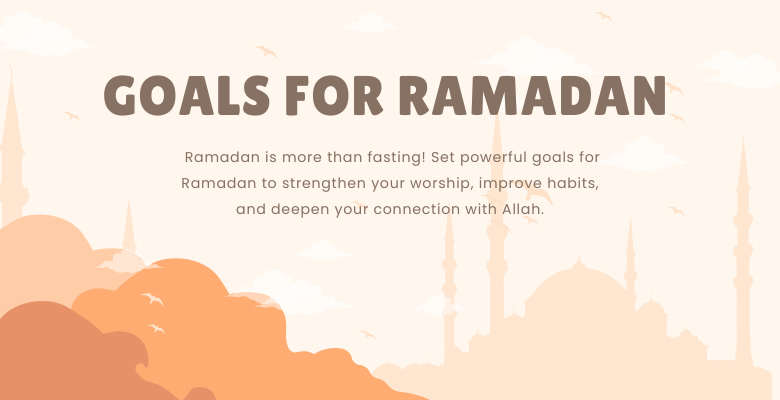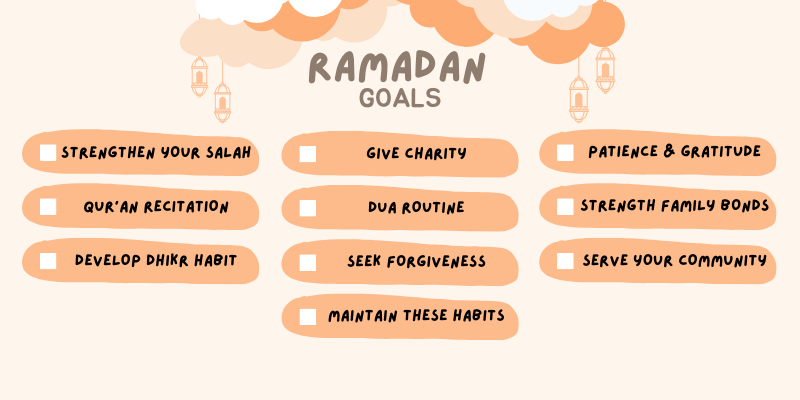10 Life-Changing Goals for Ramadan You Must Set

Do you start Ramadan with big plans but struggle to stay on track? You’re not alone. Many people set goals for Ramadan, but distractions, lack of motivation, or poor planning make them hard to achieve.
But here’s the good news: with the right approach, you can make this Ramadan truly transformative. In this guide, you’ll discover 10 powerful goals for Ramadan that will help you strengthen your faith, build better habits, and maximize your rewards.
Why Setting Ramadan Goals is Essential
Ramadan isn’t just about fasting. It’s a chance to grow spiritually, build good habits, and get closer to Allah. But without clear goals for Ramadan, it’s easy to lose focus.
Think about it—how many times have you planned to read more Qur’an or pray extra but didn’t follow through? That’s where setting goals for Ramadan helps. It gives you direction and keeps you motivated.
In this guide, you’ll find 10 powerful goals for Ramadan to make the most of this blessed month. Let’s dive in!
10 Life-Changing Goals for Ramadan You Must Set
Each goal includes why it matters and how to achieve it with simple steps.

1. Strengthen Your Salah (Prayer)
Prayer (Salah) is the foundation of Islam. But many of us rush through it or miss some prayers.
How to improve:
- Pray on time. Use an app for reminders.
- Add Sunnah (extra) prayers for extra rewards.
- Focus during Salah—understand what you’re saying.
2. Increase Qur’an Recitation
The Qur’an was revealed in Ramadan. This is the best time to connect with it.
How to do it:
- Set a daily reading target (even if it’s one page).
- Listen to Tafsir (explanation) to understand meanings.
- Read after Fajr or before Iftar when you’re more focused.
3. Develop a Daily Dhikr Habit
Dhikr means remembering Allah through short prayers like SubhanAllah (Glory be to Allah) and Alhamdulillah (All praise is due to Allah). It brings peace and rewards.
How to start:
- Say morning and evening Adhkar (remembrance).
- Keep a Tasbih (prayer beads) handy or use your fingers.
- Make Dhikr while cooking, walking, or before sleeping.
4. Give More in Charity
Ramadan is the month of giving. Every small act of kindness counts.
Ways to give:
- Donate money or food to those in need.
- Help a neighbor or relative.
- Sponsor an orphan or support a cause.
5. Improve Your Dua (Supplication) Routine
Dua is your direct connection to Allah. But many people struggle with what to ask.
How to improve:
- Make a list of personal Duas before Ramadan.
- Ask for both dunya (this life) and akhirah (the Hereafter).
- Make Dua in Sujood (prostration) and before Iftar.
6. Seek Forgiveness & Repentance
We all make mistakes. Ramadan is the perfect time to seek forgiveness.
How to do it:
- Say Astaghfirullah (I seek forgiveness from Allah) daily.
- Reflect on past mistakes and make a fresh start.
- Forgive others to purify your heart.
7. Cultivate Patience & Gratitude
Fasting teaches patience. But sometimes, hunger and thirst make us irritable.
How to stay calm:
- Take a deep breath before reacting.
- Say Alhamdulillah (All praise to Allah) for small blessings.
- Write down three things you’re grateful for each day.
8. Strengthen Family Bonds
Ramadan is a time to connect with loved ones.
Ways to bond:
- Eat Suhoor and Iftar together.
- Pray in congregation.
- Share Islamic reminders with your family.
9. Serve Your Community
Giving back is part of Islam. Helping others brings barakah (blessings).
What you can do:
- Volunteer at a local mosque or charity.
- Prepare Iftar for others.
- Check on elderly neighbors or relatives.
10. Maintain These Habits After Ramadan
The real success of your goals for Ramadan is continuing them beyond the month.
How to keep going:
- Set small, realistic goals.
- Track your progress in a journal.
- Stay connected to a supportive community.
How to Stay Consistent with Your Ramadan Goals
It’s easy to start strong and lose motivation later. Here’s how to stay on track:
- Set reminders – Use a planner or app.
- Make it a habit – Attach your goals for Ramadan to daily routines.
- Find a buddy – Encourage a friend or family member.
Final Thoughts & Call to Action
Ramadan is a golden opportunity for growth. But real success comes from setting clear goals and staying consistent. Even small efforts count, so don’t wait—start today!
Now, it’s your turn! What’s your top goal for Ramadan? Share it in the comments. Your journey might inspire someone else. Stay connected with Jannah Journeys.
If this guide helped you, share it with family and friends so they can benefit too. Let’s make this Ramadan truly life-changing!
FAQs
Q. How do I set realistic goals for Ramadan?
A. Start small. Choose goals that fit your daily routine. For example, if you’re new to reading the Qur’an, aim for a few verses daily instead of an entire chapter. The key is consistency, not perfection.
Q. What’s the best time to plan my Ramadan goals?
A. It’s best to plan before Ramadan begins. This way, you start the month with clarity and focus. However, it’s never too late! Even if Ramadan has already started, set your goals now and make the most of the remaining days.
Q. How do I balance work, family, and worship in Ramadan?
A. Prioritize wisely. Plan your day around Salah and Qur’an recitation. Use early mornings and evenings for worship. Involve your family in spiritual activities, like praying together or preparing Iftar with gratitude.
Q. How can I stay motivated to complete my Ramadan goals?
A. Remind yourself why you started. Write down your intentions and keep them visible. Track your progress and celebrate small wins. Having a friend or family member as an accountability partner can also keep you motivated.
Q. What if I miss a day of my Ramadan goals?
A. Don’t get discouraged. Life happens! Instead of quitting, adjust your plan and keep going. Focus on progress, not perfection. Every small effort still counts.
Q. How can I make my Ramadan goals last beyond the month?
A. Slowly transition them into daily habits. If you built a Qur’an reading habit, continue with smaller portions after Ramadan. If you prayed extra Sunnah prayers, keep them in your routine. The goal is long-term change, not just a one-month effort.




